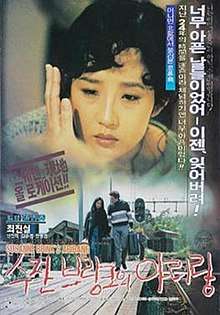Susanne Brink's Arirang
Susanne Brink's Arirang (Korean: 수잔브링크의 아리랑) is a 1991 South Korean/Swedish film based upon the life and experiences of Susanne Brink, an adult Korean adoptee from Sweden who suffered abuse and racism in her adoptive home and country. The real Susanne Brink died of cancer in January 2009 at the age of 45; she was interred in her hometown of Norrköping.
| Susanne Brink's Arirang | |
|---|---|
 Theatrical poster | |
| Hangul | 수잔브링크의 아리랑 |
| Revised Romanization | Sujan beuringkeu-ui arirang |
| McCune–Reischauer | Suchan bŭringk‘ŭ-ŭi arirang |
| Directed by | Jang Gil-su |
| Produced by | Kim Kae-sung |
| Written by | Yu U-jae Jang Gil-su |
| Starring | Choi Jin-sil |
| Music by | Shin Byung-ha |
| Cinematography | Son Hyeon-chae |
| Edited by | Kim Hee-su |
Release date |
|
| Country | South Korea Sweden |
| Language | Korean Swedish |
Cast
- Choi Jin-sil ... Susanne
- Åsa Älmeby ... Nurse
- Kim Yun-kyeong
- Malin Berghagen ... Ulrika
- Pierre Boutros ... Christer
- Lars Green ... Rune
- Pia Green ... Inger
- Jeon Suk
- Helena Lindblom
- Park Yong-soo
- Niclas Wahlgren ... Willy
- Mona Seilitz....Birgitta
- Kim Ji-young
gollark: It even has a nice code with three element symbols from the periodic table, which is cool, I should group those together.
gollark: 'Twas me.
gollark: I have nice 25ms latency but awful bandwidth.
gollark: Also, probably internet connection...
gollark: I can get most things but:* silvers* golds* dinos* chickenseventually.
References
- Hübinette, Tobias. "The Nation is a Woman: The Korean Nation Embodied as an Overseas Adopted Korean Woman in Chang Kil-su's Susanne Brink's Arirang". Intersections: Gender, History and Culture in the Asian Context, Issue 11, August 2005. Retrieved on 6 December 2008.
- Hübinette, Tobias. "The suffering and shaming of Korea". Comforting an Orphaned Nation, pp. 126–143. Retrieved on 6 December 2008.
- Hübinette, Tobias. "Susanne Brink's Arirang". The adopted Koreans of Sweden and the Korean adoption issue, pp. 9–11. Retrieved on 6 December 2008.
- Hübinette, Tobias. "Representing Adopted Korean Women in Korean Feature Films". Nationalism, Subalternity, and the Adopted Koreans, pp. 118–119. Retrieved on 6 December 2008.
This article is issued from Wikipedia. The text is licensed under Creative Commons - Attribution - Sharealike. Additional terms may apply for the media files.